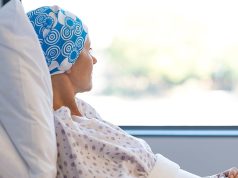Recurrence-free survival was numerically higher with adjuvant pembrolizumab, but difference was not significant
By Elana Gotkine HealthDay Reporter
THURSDAY, Oct. 23, 2025 (HealthDay News) — For patients with resected Merkel cell carcinoma (MCC), adjuvant pembrolizumab yields a trend toward improved recurrence-free survival (RFS), according to a study presented at the annual meeting of the European Society for Medical Oncology, held from Oct. 17 to 21 in Berlin.
Janice Mehnert, M.D., from NYU Langone Health in New York, and colleagues examined the role of adjuvant pembrolizumab in patients with resected MCC in a phase 3 trial. Patients with resected MCC were randomly assigned to arm A (adjuvant pembrolizumab 200 mg every three weeks for 17 doses; 147 patients) or arm B (observation; 146 patients) stratified by disease stage and intention to treat with radiation.
The researchers found that at final analysis, RFS was numerically higher in arm A than arm B (42 versus 48 recurrence events), but the difference was not statistically significant. One- and two-year RFS rates were 83 and 73 percent in arm A and 71 and 66 percent in arm B, respectively, with a median follow-up of 40 months. Significantly higher distant metastasis-free survival was seen in arm A (hazard ratio, 0.58). Among patients who did not receive adjuvant radiation, RFS was numerically but not significantly higher in arm A. Safety events were consistent with known toxicities for pembrolizumab and radiation.
“Our study provides the first solid evidence that immunotherapy with pembrolizumab postsurgery may help people with Merkel cell carcinoma by preventing their cancer from returning in organs considered distant from the site of the original disease,” Mehnert said in a statement. “This is a positive development for people who are living with the highly aggressive cancer that is Merkel cell carcinoma.”
Copyright © 2025 HealthDay. All rights reserved.








